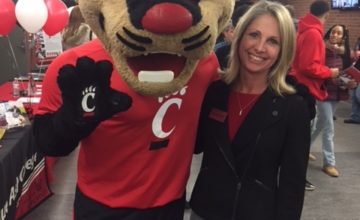“A mind that is being actively engaged and challenged is never being wasted, and brain is a muscle, if you are not using it, you are losing it,” said Maureen Bruns, of the UC Lindner College of Business. Full disclosure: This writer is the son of Maureen Bruns.
It is the first day of school and sitting beside you is a book bag filled with all the essentials. You load your pencils, paper, textbooks into your pouch and stumble out the door for your first class of the year. A wide range of emotions and reactions can arise and a new student might experience them even after just their first day. The biggest structural difference immediately effective in the transition from high school to college is the need to be prepared.
There is a syllabus, a mental map of what the year is going to be comprised of, and after meeting your teachers and making it through the first week, you may come to find out that you missed a couple of assignments. A reoccurring theme of college is that no one is going to hold your hand, and for some that is a hard adjustment. There is no teacher reminding you of homework, or notes, and you are left to your own devices to figure out the assignments. The next step, potentially, is for the student to ask themselves, “how is this fair? How can I be prepared without having someone let me know where I should be and what I should do?”
For Maureen Bruns, of the UC Lindner College of Business, the start to her day looks a little different. Before the end of summer, Bruns has already compiled forty plus assignments to be completed over the course of the year for her students, and is loaded with information, and prepared to almost create an explosion of knowledge for her sections of students. Bruns graduated from the University of Cincinnati, obtaining first her bachelor’s in accounting and later receiving her MBA from Xavier University.
After sitting down and talking to Bruns, I asked her why she thought that the general education courses that some students do not see the point in are important:
“It exposes people to topics that they are perhaps not fully interested in and exposes them to different ways of thinking. If you allow yourself, just by virtue of putting 100% into the class, you will learn valuable life skills such as showing up, engaging in activities, learning to communicate and getting along with people that might be different from you.”

Bruns clearly states that the biggest change she has noticed in her years of teaching is that the students and University rely heavily on the use of technology. It is almost essential for a student to own a laptop, and most assignments are received by the students via web platform. Bruns is also very in tune with the idea of online assignments. “It took me a while to get used to, but it is very helpful for me to be able to engage with students when we do not have a class meeting that day through email, and grading homework and seeing each students’ individual progress is a gift in itself.” College will begin establishing an online presence for the individual, in the form of email, websites, and a student potentially needing to post online for his or her other peers to see. This will give students the opportunity to begin writing professional emails and thinking about the choices they make on the internet, as future employers might be looking from behind closed doors.
As you move farther along in the journey of college, Bruns believes that students should start thinking about career opportunities applicable to their majors and who they are. “The biggest takeaway from the co-op education opportunities I took part in at Arthur Anderson, where I was learning the ins and outs of public accounting, was the true real-world experience gained from the job,” Bruns said. Co-op education opportunities provide insight on what kind of careers and work are waiting after receiving your degree. She explained, “It exposes people to all facets of society, both technical and soft skills, interacting with different people, learning to communicate effectively; It makes people more worldly.”
The last and hardest obstacle for a new college student is the need to stay motivated to get the work done. There are many distractions that can stop a newcomer into the college community from staying on track with schoolwork. “No matter what your capabilities are, if you are putting in 100%, and you are honest with yourself about that, then you are already succeeding,” she said.
The many processes Bruns has in her routine to make herself a successful teacher are very similar to a students’ routine of study success. Bruns spends upwards of 35-50 hours a week alone grading, formatting lessons, and responding to emails from her students. She is also the director of the undergraduate accounting program at the Lindner College of Business and works hard to guide students to success through material and applicable lessons. “I put a lot of time and pride into my job, and I think that if someone is able to commit a lot of time to something they are passionate about, they will in fact become great at that thing.”
Mitch Bruns is a junior at UC Blue Ash college. With a teacher as a mother, it’s hard to fail. My mother is a mentor and a prime example of how hard work in college, and in everyday life will lead to success. I wrote this from the perspective of a college student who was once struggling finding a balance of work, school, and play, and looked to the only person I knew could lift me up leading by example, My mom; “Professor Bruns”.





